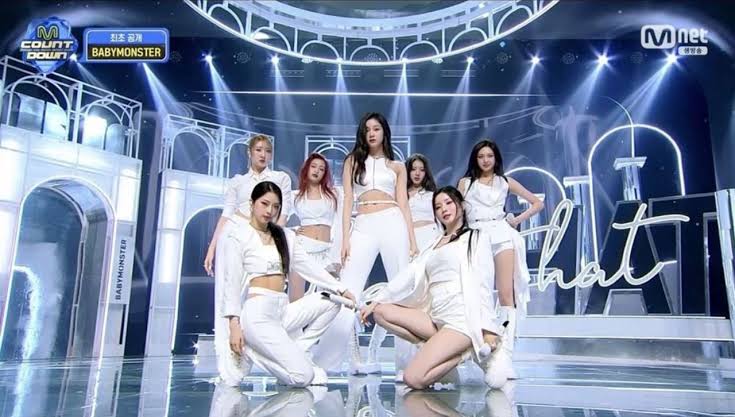Netflix’s Denial Sparks Controversy: Did They Ever Promise a Documentary on BabyMonster’s Iconic Tour?

The K-pop industry is no stranger to drama, but few stories have sparked as much controversy in recent days as Netflix’s official statement regarding a supposed documentary on BabyMonster’s Iconic Tour. Fans, entertainment insiders, and media outlets alike had been buzzing with anticipation for a high-quality documentary chronicling the rise of YG Entertainment’s rookie girl group. However, Netflix has now firmly denied ever announcing such a project.
In a world where misinformation and fan speculation can spread like wildfire, this unexpected development has ignited debates over media responsibility, corporate transparency, and the extent to which entertainment giants engage with K-pop fandoms. Did Netflix ever hint at producing a BabyMonster documentary? Were fans led on by unofficial sources, or did Netflix deliberately allow the rumor to fester to gauge interest? And more importantly—why would Netflix not want to capitalize on one of the most talked-about K-pop debuts in recent years?
The Rise of BabyMonster and the Hype Around Their Tour
Before diving into the Netflix debacle, it’s essential to understand why BabyMonster has become such a hot topic. Managed by YG Entertainment, one of the most powerful entertainment companies in South Korea, BabyMonster debuted with significant expectations on their shoulders. They were positioned as the “next BLACKPINK,” a claim that alone generated enormous global interest.
Their Iconic Tour has been nothing short of a spectacle. With record-breaking ticket sales, electrifying performances, and an international fanbase growing at an exponential rate, BabyMonster has quickly solidified itself as a major player in the K-pop industry.
Given the success of similar projects—BLACKPINK’s Light Up the Sky documentary on Netflix and BTS’s numerous behind-the-scenes docuseries—many assumed that Netflix would jump at the chance to create a BabyMonster tour documentary. Reports surfaced across social media, claiming that the streaming giant was already in talks with YG Entertainment. K-pop blogs, YouTube insiders, and even some entertainment journalists began treating the documentary as an unconfirmed but highly probable reality.
Netflix’s Statement: A Complete Denial
However, the dream came crashing down when Netflix issued an official statement:
“We would like to clarify that Netflix has never announced or planned a documentary on BabyMonster’s Iconic Tour. Any reports suggesting otherwise are inaccurate.”
For many fans, this statement felt like a slap in the face. Not because Netflix owed them a documentary, but because the hype had already reached critical mass. People had begun discussing potential release dates, the kind of behind-the-scenes footage they hoped to see, and even speculated about which members might have the most screen time.
So, what went wrong? Was this all an elaborate misunderstanding, or did Netflix benefit from the free publicity before shutting down the rumors?
Did Netflix Encourage the Speculation?
Netflix’s statement may be firm, but the timeline of events leading up to it raises questions.
-
No Immediate Denial – When speculation about the BabyMonster documentary first surfaced, Netflix remained silent. While this isn’t unusual—corporations don’t typically comment on every rumor—their lack of response allowed the buzz to grow. If they had issued a denial earlier, the speculation wouldn’t have reached the level it did.
-
The BLACKPINK Precedent – Given Netflix’s previous involvement in K-pop content, many assumed they would naturally be interested in another YG Entertainment group. Some fans even pointed to Netflix’s engagement with YG’s past projects as a form of indirect endorsement.
-
Industry Sources and Mysterious Leaks – Several entertainment insiders and influencers claimed that “sources” within YG and Netflix had confirmed talks about a BabyMonster documentary. While leaks are common in the entertainment world, Netflix’s failure to correct the record earlier contributed to the confusion.
With all these factors in play, some fans believe Netflix either allowed the rumor to fester for marketing purposes or was initially in discussions before backing out. If that’s the case, what changed?
Why Would Netflix Reject a BabyMonster Documentary?
There are a few possible reasons why Netflix may not be interested in a BabyMonster documentary at this time:
-
Market Saturation – With BTS, BLACKPINK, TWICE, and other K-pop groups already having released documentaries, Netflix might believe the genre is oversaturated. A BabyMonster documentary might not guarantee the viewership numbers needed to justify production costs.
-
Licensing and Negotiation Issues – YG Entertainment is known for being highly protective of its artists. It’s possible that discussions did happen but broke down over licensing rights, revenue sharing, or creative control.
-
Shifting Business Priorities – Netflix has been making significant changes to its content strategy, cutting down on expensive productions and focusing more on high-yield projects. A K-pop documentary, while potentially popular, may not fit into their current business model.
-
Uncertain Longevity – Unlike BLACKPINK, who had years of global success before their Netflix documentary, BabyMonster is still relatively new. Netflix might prefer to wait and see how the group’s career unfolds before investing in a documentary.
The Backlash: Fans Feel Betrayed
Regardless of the reasoning, Netflix’s denial has left many BabyMonster fans feeling frustrated and disappointed. Some are directing their anger at Netflix, accusing the company of riding the wave of speculation for free publicity. Others blame YG Entertainment for not addressing the rumors earlier or for potentially mishandling negotiations.
The controversy has also sparked debates about the credibility of entertainment news sources. In an era where social media accounts and YouTube insiders frequently break news before traditional media, misinformation spreads easily. Fans are now demanding accountability from those who first reported the alleged Netflix deal.
The Bigger Picture: What This Means for K-pop and Streaming Platforms
This situation highlights a growing tension between K-pop fandoms and streaming platforms. As K-pop continues to dominate global markets, fans expect more behind-the-scenes content and official documentaries. However, streaming giants like Netflix and Disney+ are becoming more selective about which projects they invest in.
The backlash against Netflix also underscores the power of fan expectations. When millions of people assume something to be true, even a complete denial may not be enough to undo the hype. Some fans remain unconvinced by Netflix’s statement, speculating that the company might revisit the idea in the future if enough demand persists.
Final Thoughts: A Missed Opportunity or Just a Misunderstanding?
At the end of the day, Netflix’s statement may be the final word on the matter—for now. However, this controversy has shown just how passionate and engaged K-pop fans are. Whether Netflix truly never considered a BabyMonster documentary or quietly dropped the idea remains a mystery, but one thing is clear: the demand is there.
If nothing else, this incident proves that BabyMonster is already making waves in the industry. If Netflix won’t document their journey, perhaps another streaming platform will step in to seize the opportunity. Until then, fans will have to settle for YouTube vlogs and concert footage—unless, of course, Netflix changes its mind.









